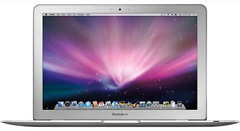Laptop uses SSD: It's expensive or broken!
The proportion of notebooks equipped with SSDs (solid-state storage devices similar to memory cards) that customers return to the store for reasons of malfunction, malfunction or poor performance accounted for 20-30% of sales. This fact can make any computer manufacturer "horrified".
In fact, it is ironic
The SSD-based notebooks are always "fabulous" and advertised as "high-end products", but it seems "expensive to not slice" in this case.
According to Avian Securities, about 10-20% of the major notebook brands' SSDs have been "snubbed" by users because of continuous crashes, data loss or jitter. Meanwhile, the notebook return rate using normal hard drives is only 1-2%.
" It is unbelievable that the SSD failure rate and malfunction are so high. It's 20 times higher than a laptop using a traditional hard disk that forces manufacturers to test themselves: Will they be real?" is the new storage technology mastered? ", Avian commented. The number of users brought back the product for reasons of poor performance, unsatisfactory expectations and not commensurate with the price. " According to customers' complaints, the SSD notebook cannot match the hard drive laptop when running heavy-duty applications such as video streaming or video editing ".
The "slap" heaven

MacBook Air, one of the notebooks using SSDs today.Source: AP
This is a "slap" in the face of the manufacturer, because in theory, SSDs must achieve at least 20% faster speed than hard drives.
According to Avian, almost all firms involved in the notebook SSD market are faulty. Dell has always been the most active promoter for SSDs, and ironically, it seems that its products are also the most returned.
Dell representatives refused to disclose the percentage of machines that were damaged or returned by customers, but admitted that SSDs were "inferior" when running data exchange applications such as Microsoft Outlook. Even so, Dell is trying to salvage that the drawbacks of SSDs are being remedied "quickly and positively".
For example, storage capacity has doubled (from 32GB to 64GB) since this technology has been released to date. As planned, Samsung will launch 256GB SSD at the end of 2008. Besides, if the first generation of SSDs only achieved data reading speed equivalent to 5400 rpm, last month, Dell announced a new high-speed SSD with 35% higher efficiency. Most importantly, Dell is committed to cost-effective SSDs at least no higher than current SSD products.
Dark prospects for flash industry
Sad PC vendors have, even the flash memory industry is equally puzzled by information published by Avian. Sales of flash memory chips have slowed significantly recently, and SSDs are expected by many firms (especially Samsung) to open a huge new revenue channel.
Compared to conventional flash memory chips, SSDs can store much more, with nearly the same capacity as computer hard drives. Compared to hard drives, SSDs are superior in their ability to not lose data in case of sudden power failure.
Besides, laptops using SSDs are also very quiet - not making loud noises like laptops using traditional hard drives.
However, the biggest barrier to SSDs to the mass market is its cost. With a price of 200-300USD / SSD, each notebook equipped with this storage technology must cost no less than 900USD, while the performance and configuration are not strong.
" The flash memory market is falling into an overproduction crisis, supply exceeds demand. As a result, selling prices continue to fall, even cheaper than the original production cost ," said analyst Jim Handy of Objective Analysis. know.
You should read it
- ★ Things to know when upgrading hard drives to SSDs for laptops
- ★ Samsung has released the 860 Evo hard drive and the 860 Pro succeeds the most successful SSDs ever
- ★ Top 10 best SSD hard drive 2021
- ★ Intel produced SSD drives shaped rulers, wanted to set a record of storage capacity
- ★ 4 bad sectors checking and fixing software on SSDs for free